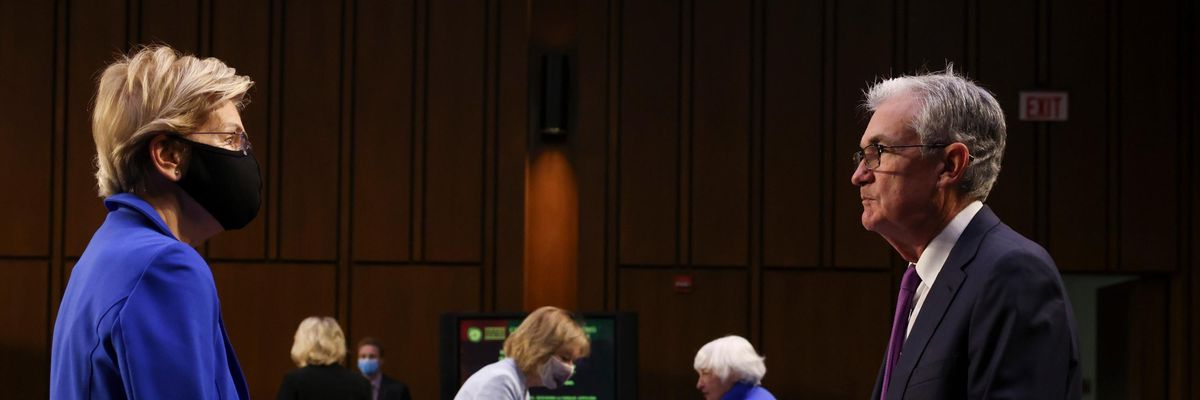A group of 10 congressional Democrats and Independent Sen. Bernie Sanders on Monday asked Federal Reserve Chair Jerome Powell to estimate how many millions of U.S. workers will be out of a job next year due to the central bank's rate-hiking frenzy, which is expected to continue this week as the Federal Open Market Committee meets to discuss further increases.
In a letter led by Sen. Elizabeth Warren (D-Mass.) and Rep. Madeleine Dean (D-Pa.), the lawmakers point specifically to Powell's "disturbing warning to American families" in August that "they should expect 'pain' over the coming months as the Fed takes 'forceful and rapid steps' to 'get supply and demand back into alignment... by slowing the economy.'"
"Experts are calling out Chair Powell and the Federal Reserve's interest rate bender for what it is: misguided policy with catastrophic outcomes."
"You continue to double down on your commitment to 'act aggressively' with interest rate hikes and 'keep at it until it's done,' even if '[n]o one knows whether this process will lead to a recession or if so, how significant that recession would be,'" the letter reads, further quoting the Fed chair. "These statements reflect an apparent disregard for the livelihoods of millions of working Americans, and we are deeply concerned that your interest rate hikes risk slowing the economy to a crawl while failing to slow rising prices that continue to harm families."
The letter, also signed by Rep. Rashida Tlaib (D-Mich.) and Sen. Bernie Sanders (I-Vt.), was sent as Fed policymakers convened in the nation's capital to decide on the size of the next interest rate increase, which is set to be announced Wednesday. A 75-basis-point hike is widely expected, marking the fourth consecutive increase of that size even as a growing chorus of experts and analysts raise concerns about mass job loss.
Some observers are expecting the Fed to offer "pivot language" signaling that the end of demand-crushing rate increases is near, but others--including the Fed's former vice chair--have said the central bank is likely to continue hiking rates in 2023.
"Experts are calling out Chair Powell and the Federal Reserve's interest rate bender for what it is: misguided policy with catastrophic outcomes for the millions around the country who are already struggling to make ends meet," Rakeen Mabud, chief economist at Groundwork Collaborative, said in a statement Tuesday. "The Fed's rate-hiking frenzy is doing everything but lowering prices. Wage growth is slowing and mortgage rates are the highest in 20 years. If Powell wants to be taken seriously as a responsible steward of the economy, he should think twice before raising rates again."
Powell has been open about the Fed's projection of a higher unemployment rate of 4.4% next year compared to the current rate of 3.5%, but the lawmakers' new letter pushes him to make clear the number of workers who will be impacted by that increase.
"According to the Fed's estimates, how many job losses, in millions, would that forecast imply?" the lawmakers ask.
Warren's office put the question more bluntly in a press release: "How many millions will be thrown out of their jobs from [the] Fed's dangerous rate hikes?"
Outside estimates indicate that roughly 1.5 million U.S. workers would lose their jobs under the Fed's projected scenario of 4.4% unemployment by 2023. Bank of America has suggested the Fed's predicted unemployment rate likely underestimates the scale of job losses coming over the next year as recession indicators blare.
The Fed's own economist has also warned of a "severe recession" induced by aggressive interest rate increases, which critics say do nothing to tackle key drivers of inflation such as corporate price gouging.
During a press conference following the Fed's September meeting, Powell was asked whether he views more than a million additional unemployed workers as an "acceptable" outcome of the central bank's policy moves.
"We're never going to say that there are too many people working, but the real point is this: Inflation--what we hear from people when we meet with them is that they really are suffering from inflation," Powell responded. "And if we want to set ourselves up, really light the way to another period of a very strong labor market, we have got to get inflation behind us."
"I wish there were a painless way to do that," he added. "There isn't."
But analysts have disputed and rejected Powell's suggestion that major job losses are inevitable if the Fed is to succeed in bringing inflation under control. Justin Bloesch, a fellow at the Roosevelt Institute, wrote in a blog post last month that "the labor market as of October 2022 isn't that much tighter than it was in 2019."
"Employment growth has been remarkably even across sectors, and slowing wage growth in low-wage occupations confirms further that tightness is falling," Bloesch noted. "There is thus little reason to think that today's 3.5% unemployment rate is inherently more inflationary than it was in 2019."
"While further lowering the quit rate and the pace of wage growth will likely help bring down inflation by some amount, not much has changed to make one conclude that the unemployment rate consistent with low inflation, the so-called 'natural rate,' is higher than before," he added. "Instead, it looks increasingly possible that the labor market can return to a strong but not overheating equilibrium, giving time for supply-side issues to be resolved and bring inflation back down."

